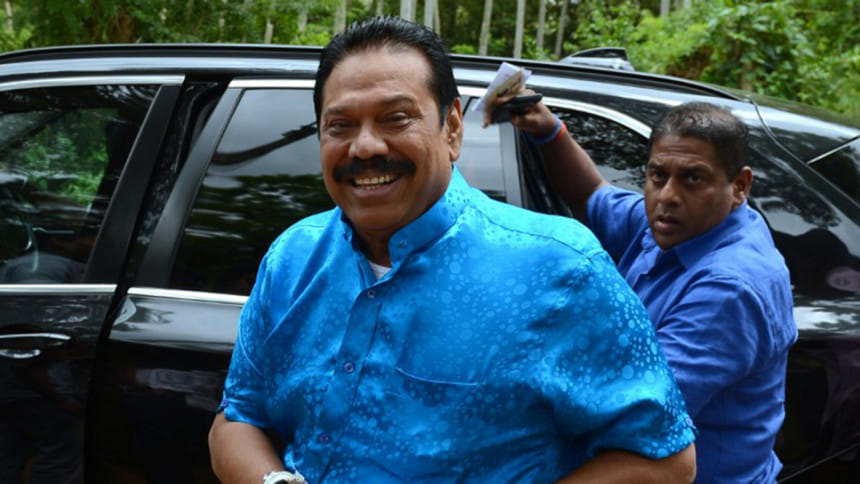Rajapakse concedes election defeat

Sri Lanka's former strongman Mahinda Rajapakse admitted his dream of a political comeback was over on Tuesday, conceding defeat in parliamentary elections while his victorious rival appealed for unity.
Only eight months after his shock defeat in presidential polls, Rajapakse acknowledged there would be no swift return to power in the role of prime minister after the party of incumbent Ranil Wickremesinghe took an unassailable lead.
"My dream of becoming prime minister has faded away," Rajapakse told AFP in an early morning phone interview.
"I am conceding. We have lost a good fight."
While he had been bullish about his chances on polling day, Rajapakse's tone had changed sharply on Tuesday as he accepted his United People's Freedom Alliance (UPFA) had lost, long before the final results.
The outcome represents another bitter blow for Rajapakse, who led Sri Lanka for a decade before he was dramatically ousted by his one-time ally Maithripala Sirisena in a January 8 presidential election.
Since then, he has seen a welter of corruption accusations levelled against him and his close relatives, including his wife.
"There were some who criticised me then (January) for conceding so early in the count, but I did it because it was the right thing to do," Rajapakse said of the January polls. "This time too we have lost."
"We have won eight districts and the UNP (ruling United National Party) has 11 (out of a total of 22)," Rajapakse said. "This means we have lost. It was a difficult fight."
No party appears to have secured an absolute majority of 113 seats in the 225-member parliament, which will force the new government to seek out smaller allies.
While stopping short of proclaiming victory for his party, Wickremesinghe said the outcome was an endorsement of the "January 8 revolution" which brought him to power.
"I thank all those who worked for the victory of the people," Wickremesinghe said in a statement.
"It is not necessary to divide the people as winners and losers. I urge all to unite and help build our nation."
A top aide to the prime minister said the statement amounted to a de facto declaration of victory but Wickremesinghe did not want to strike a triumphant tone.
"He wants to play it down because the thrust of the new government is inclusiveness, unity and reconciliation," the aide told AFP.
- Referendum on Rajapakse -
Rajapakse remains hugely popular among large sections of the majority Sinhalese community for presiding over the crushing defeat of Tamil guerrillas in 2009 after their 37-year war for a separate homeland.
But the 69-year-old remains a polarising figure on an island still struggling to come to terms with the past.
He was shunned by Western governments over the brutal end to the island's ethnic conflict, and remains deeply unpopular among its Tamil and Muslim minorities.
The perception that nepotism and corruption flourished during his administration also damaged his political reputation.
Rajapakse secured a seat in the parliament by standing for the north-western district of Kurunegala after ditching his home constituency of Hambantota, where three of his close family members contested and one of them lost.
Sirisena had called the general election a year ahead of schedule to try to strengthen his numbers in the parliament so he could push through promised reforms.
Wickremesinge, who is almost certain to remain as prime minister, had described Monday's vote as a referendum on Rajapakse.
As president, Rajapakse cultivated close ties with China during his decade in power, but Sirisena and Wickremesinghe have been trying to steer Colombo away from Beijing's close embrace and have made concerted efforts to improve ties with giant neighbour India.
- Peaceful vote -
Since his surprise victory over his former mentor, Sirisena has struggled to impose his authority over his United People's Freedom Alliance (UPFA) party and was powerless to prevent Rajapakse from standing as one of its candidates.
He threatened to invoke his executive powers to prevent his combative predecessor from becoming prime minister, but Rajapakse was banking on a strong showing to force Sirisena to back down.
Elections Commissioner Mahinda Deshapriya said the vote had been one of the most peaceful in Sri Lanka's history.
The mood on the streets was subdued on Tuesday, with celebrations and street processions banned for a week after the polls under Sri Lankan election laws.

 For all latest news, follow The Daily Star's Google News channel.
For all latest news, follow The Daily Star's Google News channel. 



Comments